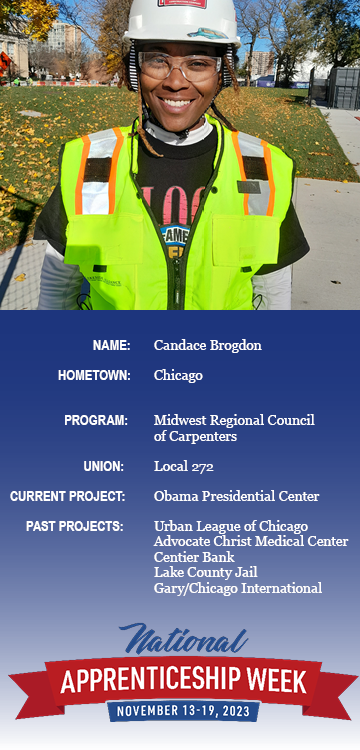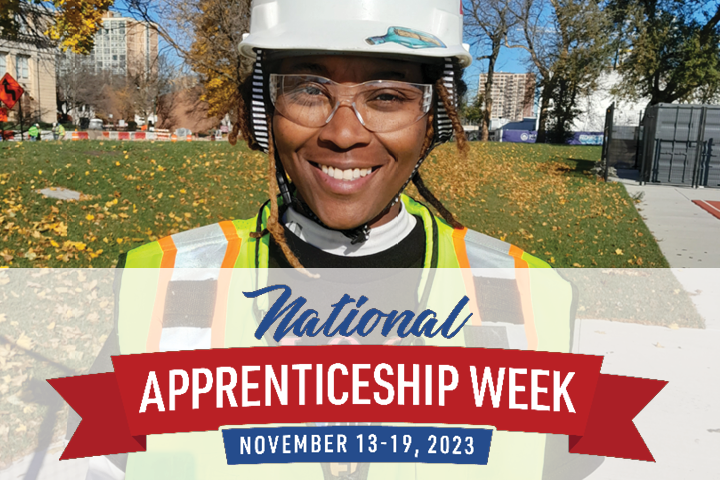National Apprenticeship Week (NAW) is a great opportunity to learn about the benefits of apprenticeships and apprenticeship programs. This year, NAW is November 13-19 and the theme is “Registered Apprenticeships: Superhighways to Good Jobs.”
According to the U.S. Department of Labor and apprenticeship.gov, apprenticeship programs are a proven, industry-driven training model that provides a critical talent pipeline of skilled workers. The pipeline is a direct route for addressing local, regional, and national workforce shortages while also providing an earn-while-you-learn program for participants. Apprenticeships lead to long-lasting, stable, and in-demand careers with good salaries and benefits.
Hiring apprentices is a key component of Powers & Sons’ talent development strategy. “Apprenticeships are essential for building strong local economies, advancing gender and racial equity, supporting underserved communities, and providing the training needed for successful careers,” explains President & COO Claude Powers. Two programs he recommends in the Northwest Indiana and Chicago region are:
- Indiana Kentucky Ohio Regional Council of Carpenters
- We Build Northwest Indiana Registered Apprenticeships
Who is a typical apprentice? Meet Candace.
Q: What skills are you gaining?
A: Every day is different and depends on the journeyman teaching me. One thing I’ve noticed is that as I gain skills, I’m able to independently develop my own pace on the job. There is less anxiety as my knowledge increases. I’m also getting stronger in my ability to identify all components that I need to start or complete on a project. When I know I’m working with wood, I know I’ll need a saw, driver or drill, screws, and nails. That’s a really simple example, but it continues throughout the work day. My supervisors expect me to think ahead and be proactive.
Q: What concepts are you learning?
A: One fun thing is exploring the intended purpose of materials, then gaining the confidence and power to manipulate them into what I need. Once I know and understand the material, I know the extent to which I can push it and myself. I’m also learning to visualize shapes into structures.
Q: Do you believe construction is a good career path, especially for women?
A: I don’t think any particular career path is good or bad, per se. To me, the true question is what are you willing to do to push yourself, perfect your craft, and build a reputation? Carpentry is a career path that requires confidence. It is a craft that requires attention to detail, strong organizational skills, and a sense of passion and pride in your work. In the beginning, I think some of the guys doubted whether I could hold my own. But I show up each day with a growing sense of confidence and knowing I can accomplish what’s required. I encourage anyone who is curious about the world of construction to do their research, then give it a try. There are lots of different trades, so see which ones interest you the most. I also encourage people to not let gender expectations or a traditional sense of gender roles determine their career path. In life, most things are about your work ethic, not chromosomes.
Q: What advice would you offer someone who wants to become an apprentice in one of the skilled general trades?
A: Do your research! I joined Chicago Women in Trades, which exposed me to every trade. There are lots of other organizations, as well as things like construction expos and career seminars. Skills can be learned, but it does help to have innate skills and some natural talent. If you want to be an apprentice, be ready to work. You’ll find all kinds of people on the job site. Sometimes, you’ll be rushed and under pressure to meet a deadline. You’ll make mistakes and may even be talked down to because you are new and still learning. Don’t let a learning curve deter you from the project at hand or your long-term goals.
Q: How did you initially become interested in a career in the skilled trades?
A: The housing market was a big influence for me. Discrimination is unfair. Inflated prices are real. Buying a home is filled with strenuous requirements and buyers can face prejudice. As I gain knowledge about the building trades and property development, I want to help bridge the gap to affordable homes. I believe green building and sustainable designs for active, healthy lifestyles can reduce poverty rates in families and communities. So, learning about construction is the first step. Joining the trades is about improving opportunities for me, my community, and those who come after us.
Q: What are your career goals in the next 10 to 15 years?
A: I will be a journeyman and may possibly pursue a role as a business agent (BA) journeyman. For me, a key interest and career goal centers on sustainability. I hope to ultimately be in a position to purchase land and build homes. Maybe even refurbish RVs into tiny homes. I want to take my craft around the world and have fun while doing it. I’ll continue to perfect my skills and gain knowledge that no person or company can take from me. I’ve heard that a lot in the trades and it’s true.

